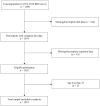Association Between Dietary Patterns and Cognitive Function in Midlife Adults: The Bogalusa Heart Study
- PMID: 40431376
- PMCID: PMC12113793
- DOI: 10.3390/nu17101636
Association Between Dietary Patterns and Cognitive Function in Midlife Adults: The Bogalusa Heart Study
Abstract
Background: Individual nutrients are associated with cognitive performance, but there is less evidence on the relationship between overall dietary patterns and cognitive performance in midlife. Objective: To examine the relation between dietary patterns and cognitive performance in midlife adults within the Bogalusa Heart Study (BHS). Methods: Cross-sectional data from the 2013-2016 cycle of the Bogalusa Heart Study, a life-course prospective cohort study, were used to generate diet quality scores, including the Alternate Healthy Eating Index 2010 (AHEI), the Healthy Eating Index 2015 (HEI), and the Alternate Mediterranean Dietary Pattern (aMed), based on food frequency questionnaires. Cognitive scores assessing attention and processing, episodic memory, and executive function were generated through validated cognitive tests. Generalized linear and logistic regression models were fit with adjustment for potential confounders. Results: Of 1053 participants included in the analysis, the mean age was 48.18 (SD = 5.22) years; 38.94% were male; and 31.14% identified as Black. Higher diet quality scores were associated with a higher global cognitive score (P-trend = 0.01 for AHEI, 0.02 for HEI, and 0.04 for aMed) after adjusting for age, sex, race, employment, education, smoking status, total energy intake, physical activity, BMI, diabetes, and hypertension. In dichotomous outcome analyses, higher AHEI and aMed scores remained inversely associated with low cognition when adjusting for similar covariates (P-trend = 0.03 for AHEI, 0.03 for aMed), but the association was attenuated to non-significance for HEI. In joint effect analysis between employment and dietary patterns (P-interaction = 0.28 for AHEI, 0.01 for HEI, and 0.11 for aMed), unemployment with a lower quality diet was associated with lower cognitive performance (P-trend = 0.02 for AHEI, 0.02 for HEI, and 0.01 for aMed). Conclusions: A high-quality diet is associated with optimal cognitive performance among midlife adults, and unemployment status may influence this association. These findings suggest that dietary interventions during midlife may represent a public health strategy to preserve cognitive function and reduce future neurodegenerative disease burden, especially in disadvantaged populations.
Keywords: alternate healthy eating index; bogalusa heart study; cognitive function; diet quality; healthy eating index; mediterranean diet; midlife adults.
Conflict of interest statement
All authors report no conflict of interest.
Figures
References
-
- FastStats. [(accessed on 20 October 2024)];2024 Available online: https://www.cdc.gov/nchs/fastats/leading-causes-of-death.htm.
-
- Alzheimer’s Disease and Dementia Alzheimer’s Disease Facts and Figures. [(accessed on 20 October 2024)]. Available online: https://www.alz.org/alzheimers-dementia/facts-figures.
MeSH terms
Grants and funding
LinkOut - more resources
Full Text Sources




